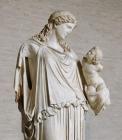Βάτραχοι (Χορός 1528-1533) [Le Rane, Coro 1528-1533 / Frogs, Chorus 1528-1533]
Aristofane / ἈριστοφάνηςLangue: grec ancien

Πρῶτα μὲν εὐοδίαν ἀγαθὴν ἀπιόντι ποητῇ
εἰς φάος ὀρνυμένῳ δότε, δαίμονες οἱ κατὰ γαίας,
τῇ δὲ πόλει μεγάλων ἀγαθῶν ἀγαθὰς ἐπινοίας.
πάγχυ γὰρ ἐκ μεγάλων ἀχέων παυσαίμεθ᾽ ἂν οὕτως
ἀργαλέων τ᾽ ἐν ὅπλοις ξυνόδων. Κλεοφῶν δὲ μαχέσθω
κἄλλος ὁ βουλόμενος τούτων πατρίοις ἐν ἀρούραις.
εἰς φάος ὀρνυμένῳ δότε, δαίμονες οἱ κατὰ γαίας,
τῇ δὲ πόλει μεγάλων ἀγαθῶν ἀγαθὰς ἐπινοίας.
πάγχυ γὰρ ἐκ μεγάλων ἀχέων παυσαίμεθ᾽ ἂν οὕτως
ἀργαλέων τ᾽ ἐν ὅπλοις ξυνόδων. Κλεοφῶν δὲ μαχέσθω
κἄλλος ὁ βουλόμενος τούτων πατρίοις ἐν ἀρούραις.
envoyé par Dq82 - 5/9/2018 - 20:24
Langue: italien
Traduzione italiana di Ettore Romagnoli
Pria concedete, o Demoni d'abisso, buon viaggio
al vate che, lasciandone, torna del sole al raggio;
e alla città consigli che rechin buoni frutti.
Fine avranno in tal modo le grandi ambasce e i lutti
delle guerresche imprese; e faccia pur la guerra
Cleofonte o chi brama n'ha, nella propria terra.
al vate che, lasciandone, torna del sole al raggio;
e alla città consigli che rechin buoni frutti.
Fine avranno in tal modo le grandi ambasce e i lutti
delle guerresche imprese; e faccia pur la guerra
Cleofonte o chi brama n'ha, nella propria terra.
envoyé par Dq82 - 5/9/2018 - 20:25
Langue: italien
Traduzione italiana di Raffaele Cantarella
E voi, divinità infere concedete anzitutto felice viaggio
al poeta che se ne va e risale alla luce;
e alla città buoni pensieri per grandi fortune;
così saremo completamente liberati da grandi affanni e da tristi adunate in armi.
Cleofonte poi, e chi altro di loro ne ha voglia,
vada a combattere sui campi della sua patria.
al poeta che se ne va e risale alla luce;
e alla città buoni pensieri per grandi fortune;
così saremo completamente liberati da grandi affanni e da tristi adunate in armi.
Cleofonte poi, e chi altro di loro ne ha voglia,
vada a combattere sui campi della sua patria.
envoyé par Dq82 - 1/2/2019 - 21:05
Langue: anglais
Translated into English rhyming verse by Gilbert Murray from archive.org
Peace go with him and joy in his journeying ! Guide ye our poet
Forth to the light, ye Powers that reign in the Earth and below it ;
Send good thoughts with him, too, for the aid of a travailing nation.
So shall we rest at the last, and forget our long desolation,
War and the clashing of wrong. — And for Cleophon, why, if he'd rather,
Let him fight all alone with his friends, in the far-off fields of his father.
Forth to the light, ye Powers that reign in the Earth and below it ;
Send good thoughts with him, too, for the aid of a travailing nation.
So shall we rest at the last, and forget our long desolation,
War and the clashing of wrong. — And for Cleophon, why, if he'd rather,
Let him fight all alone with his friends, in the far-off fields of his father.
envoyé par Dq82 - 3/2/2019 - 20:22
Langue: anglais
English Translation and Notes by Ian Johnston by ARISTOPHANES’ Frogs A Dual Language Edition
First, all you spirits underneath the ground,
let’s bid our poet here a fond farewell,
as he goes upward to the light. To the city
grant worthy thoughts of every excellence.
Th en we could put an end to our great pain,
the harmful clash of arms Let Cleophon(*) —
and all those keen to fi ght — war on their enemy
in their ancestral fi elds, on their own property
let’s bid our poet here a fond farewell,
as he goes upward to the light. To the city
grant worthy thoughts of every excellence.
Th en we could put an end to our great pain,
the harmful clash of arms Let Cleophon(*) —
and all those keen to fi ght — war on their enemy
in their ancestral fi elds, on their own property
(*) Cleophon was a leader of the pro-war party. Th e point
here is that many of those advocating war were not putting their own
property in danger, unlike many Athenian farmers and landowners
whose lands were occupied by the enemy forces.
here is that many of those advocating war were not putting their own
property in danger, unlike many Athenian farmers and landowners
whose lands were occupied by the enemy forces.
envoyé par Dq82 - 5/2/2019 - 10:39
×
![]()






Questi versi da le Rane sono rimasti a lungo in attesa di essere approvati, forse una delle attese più lunghe di sempre.
La commedia Le Rane è apparsa la prima volta sulla scena ad Atene 2 423 anni fa, alle Lenee, risultando vincitrice.
E’ una commedia non facile ed il fatto che si svolge nel regno degli Inferi davanti a Dioniso, accompagnato dal suo servo Xantia, di fronte ai cittadini defunti che non fanno che parlare della polis in crisi, la rende ancora più complessa. Le Rane è il nome del coro della palude infernale.
Dioniso intende riportare in vita un tragico estinto, ma incontra Eschilo che litiga furiosamente con Euripide per stabilire chi dei due è il più grande. Dioniso, a prescindere dalle sue personali preferenze, vuole scegliere come criterio selettivo la giustizia ed il bene dei cittadini, perciò fa portare una bilancia ed invita i due tragici a recitare alcuni loro brani. Viene prescelto Eschilo che accetta di tornare tra i vivi, lasciando Sofocle in trono alla destra di Plutone a patto che non lo ceda mai ad Euripide, morto nel 400, un anno prima delle Rane.
Fin qui le vicende della tragedia tratte da qui. Ma perché tra le CCG? Pur avendo studiato al liceo classico, non mi ero mai reso conto della bellezza e della modernità di questa commedia finché non è stata trasmessa in televisione interpretata al teatro di Siracusa da Ficarra e Picone.
Ma la commedia di per se, non è contro la guerra.
Aristofane si fa beffe del politico di turno: Cleofonte, di cui in realtà era un un'oppositore, ne preannuncia anche la morte.
(Già nell'antica Atene i comici facevano i politici)
Ma il coro finale che qui è presentato, mi ha colpito, ricorda la chiosa finale de Le déserteur:
del sangue ad ogni costo,
andate a dare il vostro,
se vi divertirà."